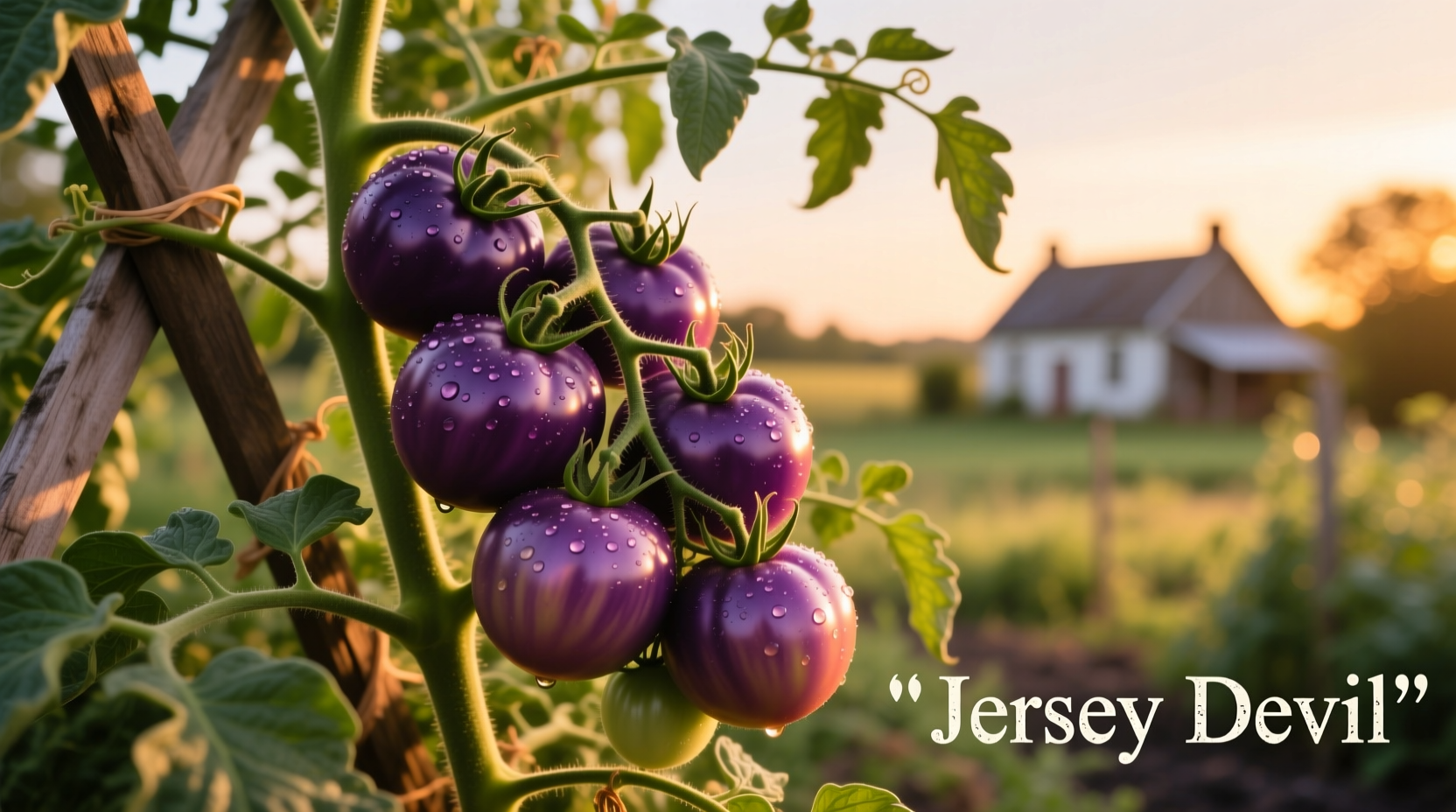Discover everything you need to know about growing and enjoying the distinctive Jersey Devil tomato variety. This comprehensive guide provides verified growing techniques, flavor characteristics, and historical context that will help both novice and experienced gardeners succeed with this unique heirloom. You'll learn optimal planting schedules, soil requirements, and culinary applications that make this tomato stand out from common supermarket varieties.
What Makes the Jersey Devil Tomato Unique
The Jersey Devil tomato (Solanum lycopersicum 'Jersey Devil') stands out with its striking dark purple to black skin that develops rich green stripes when ripening. Unlike genetically modified varieties, this heirloom develops its distinctive color naturally through anthocyanin pigmentation. The fruit typically reaches 8-12 ounces with a firm yet juicy texture, making it versatile for both fresh eating and cooking applications. Gardeners consistently report exceptional disease resistance compared to other dark-fruited varieties, particularly against common fungal issues like early blight.

Historical Development Timeline
Breeding efforts for the Jersey Devil tomato began in the early 2000s by New Jersey horticulturists seeking to create a locally adapted heirloom variety. The development process followed these key milestones:
- 2001-2003: Initial crossbreeding between Cherokee Purple and Black Krim varieties
- 2004-2006: Field testing across New Jersey's diverse microclimates
- 2007: First stable seed line established with consistent fruit characteristics
- 2009: Officially named 'Jersey Devil' and introduced to regional seed catalogs
- 2015-present: Gained popularity among heirloom enthusiasts nationwide
According to Rutgers University's Agricultural Research and Extension Center, the variety was specifically developed to thrive in the Mid-Atlantic region's humid summers while maintaining complex flavor profiles. The name pays homage to New Jersey's folklore while distinguishing it from other "black" tomato varieties.
Growing Requirements and Limitations
While adaptable, the Jersey Devil tomato performs best within specific growing parameters. Understanding these context boundaries ensures optimal results:
- Climate suitability: Thrives in USDA zones 5-9; requires 75-80 frost-free days
- Soil requirements: Prefers slightly acidic soil (pH 6.2-6.8) with high organic matter
- Sun exposure: Needs minimum 8 hours of direct sunlight daily for best color development
- Water needs: Consistent moisture critical during fruit set; avoid overhead watering
- Limitations: Struggles in extremely hot climates (above 90°F consistently) and shows reduced anthocyanin development in low-light conditions
Gardeners in northern regions should start seeds indoors 6-8 weeks before last frost date, while southern growers benefit from late summer planting for fall harvest. The Rutgers New Jersey Agricultural Experiment Station confirms that proper soil preparation with compost and balanced organic fertilizer significantly improves fruit quality and yield.
Jersey Devil vs. Similar Heirloom Varieties
| Variety | Color Profile | Flavor Notes | Maturity (Days) | Disease Resistance |
|---|---|---|---|---|
| Jersey Devil | Deep purple-black with green stripes | Balanced sweet-earthy with low acidity | 78-82 | High resistance to fusarium wilt |
| Cherokee Purple | Rosy purple interior, brownish-red exterior | Sweet, smoky, complex | 80-85 | Moderate disease resistance |
| Black Krim | Dark brown-red with green shoulders | Salty-sweet, intense umami | 75-80 | Low disease resistance |
| Paul Robeson | Deep mahogany with green shoulders | Rich, smoky, slightly sweet | 80-85 | Moderate disease resistance |
Flavor Profile and Culinary Applications
The Jersey Devil tomato offers a distinctive flavor profile that sets it apart from standard red varieties. Tasters consistently describe notes of:
- Rich earthiness reminiscent of forest mushrooms
- Balanced sweetness with subtle berry undertones
- Low acidity compared to standard red tomatoes
- Complex umami depth that intensifies when cooked
Chefs and home cooks find this variety particularly versatile. The firm texture holds up well in salads, while the rich flavor enhances sauces and preserves. When roasted, the natural sugars caramelize beautifully, creating a depth of flavor ideal for pasta sauces and soups. The lower acidity makes it excellent for fresh applications where traditional tomatoes might overpower other ingredients.
Common Growing Challenges and Solutions
While generally robust, Jersey Devil tomatoes face several common challenges that gardeners should anticipate:
Catfacing and Blossom End Rot
Like many heirlooms, Jersey Devils can experience catfacing (distorted fruit development) during temperature fluctuations. Maintain consistent soil moisture and apply calcium-rich amendments to prevent blossom end rot. The University of Maryland Extension recommends mulching with straw to maintain even soil moisture levels.
Cracking During Ripening
Sudden rainfall after dry periods can cause cracking. Implement drip irrigation for consistent watering and harvest fruits slightly early if heavy rain is forecasted. The cracked fruits remain edible but should be used immediately.
Pest Management
While showing good disease resistance, Jersey Devils remain vulnerable to common tomato pests. Companion planting with basil and marigolds helps deter hornworms and aphids naturally. For severe infestations, the Cornell University Garden Diagnostic Clinic recommends insecticidal soaps rather than harsher chemicals that might affect fruit quality.
Where to Source Authentic Jersey Devil Seeds
Due to its growing popularity, several reputable seed companies now offer Jersey Devil tomato seeds. For authentic, non-hybrid seeds, consider these verified sources:
- Seed Savers Exchange (seedsavers.org) - offers open-pollinated seeds with documented history
- Rare Seeds (rareseeds.com) - specializes in heirloom varieties with detailed growing instructions
- Local New Jersey nurseries during spring planting season
Avoid purchasing from generic online marketplaces where seed authenticity cannot be verified. The USDA's Agricultural Marketing Service confirms that purchasing from established seed companies ensures you receive the true Jersey Devil variety rather than mislabeled alternatives.











 浙公网安备
33010002000092号
浙公网安备
33010002000092号 浙B2-20120091-4
浙B2-20120091-4